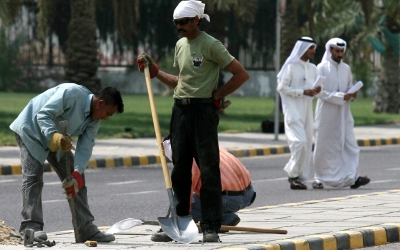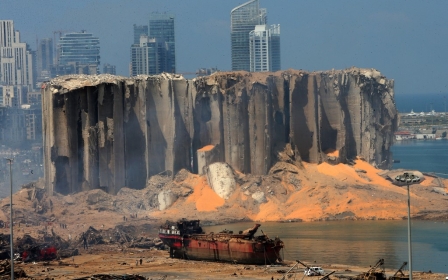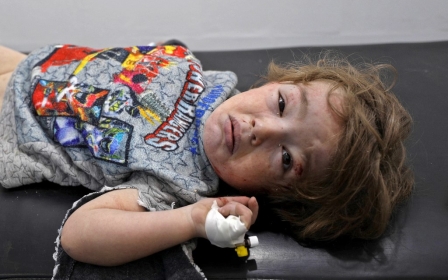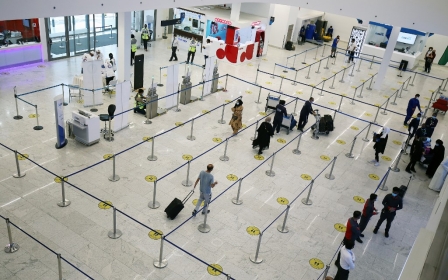Arabic press review: 530,000 expats could face expulsion from Kuwait
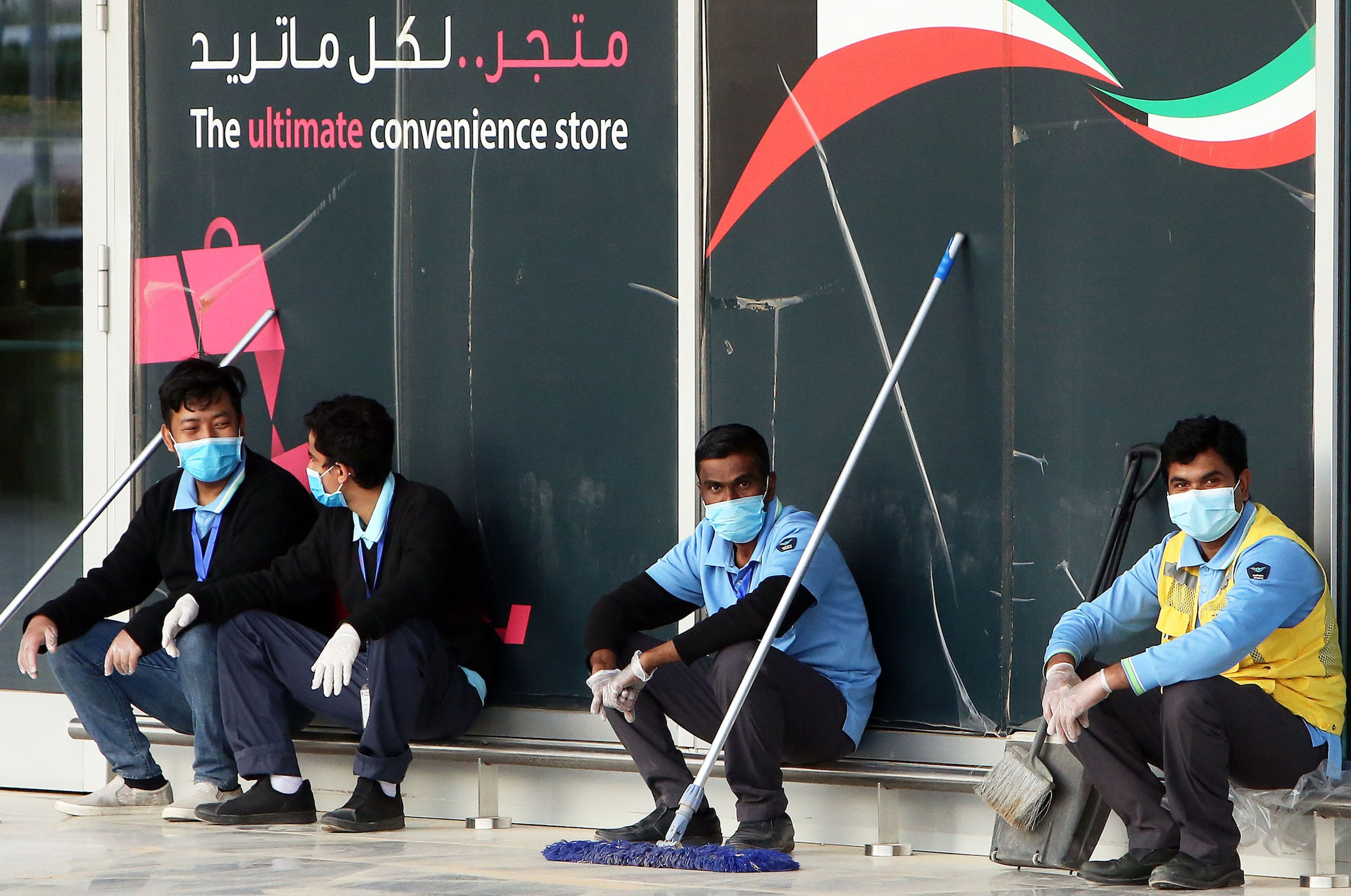
Kuwait to slash foreign workforce
More than half a million foreigners in Kuwait could face expulsion under a new government proposal to address the labour market imbalance in the country, Kuwaiti newspaper Al-Qabas reported.
Minister of State for Economic Affairs Maryam al-Aqeel presented to the Kuwaiti parliament a plan to “readdress labour market imbalances and their impact on demographics” with short, medium and long-term measures.
The government said its short-term goal was to remove around 360,000 expats, including 120,000 illegal workers who have a “negative impact” on the country. The phase would also purge 90,000 unskilled workers, as well as 150,000 who are over 60 years old or suffering from chronic diseases.
The aim would be to gradually replace as many as 160,000 expat jobs in both the public and private sectors with Kuwaiti citizens, as part of a job nationalisation programme.
New MEE newsletter: Jerusalem Dispatch
Sign up to get the latest insights and analysis on Israel-Palestine, alongside Turkey Unpacked and other MEE newsletters
In total around 530,000 expatriates would be removed under the government proposal, according to Al-Qabas, which has seen a copy of the plan. However, it did not set a timetable for implementation.
The head of the National Assembly human resources committee, Khalil al-Saleh, said the panel had asked the government to clarify the timetables for implementing its plan before submission to the council for approval.
Kuwaiti nationals are a minority in their own country. Between 20015 and 2019, the population of Kuwait more than doubled to 4.42 million, while the number of citizens grew only by 55 percent - from 860,000 to 1.335 million - as compared to the expat population that exploded from 1.33 million to 3.08 million, the government told parliament in its presentation, according to Kuwait Times.
Low oil prices and the coronavirus lockdown have severely impacted the country's economy, prompting demands that the government reduce the number of expatriates in the country and provide more jobs for Kuwaitis.
Last month a new bill was approved by Kuwait's parliament limiting the number of Indians to no more than 15 percent of Kuwait’s population. The law, which is to be implemented later this year, could see hundreds of thousands of Indian residents - 1.45 million or 30 percent of population - forced to leave the country.
Syrians ‘terrorised’ by virus outbreak
A recent surge in coronavirus cases in Damascus and surrounding areas has panicked residents, who say they are “terrorised” by the virus and “fear going to government hospitals” due to poor facilities and treatment provided, Saudi newspaper Asharq al-Awsat reported.
Doctors, activists and media outlets have also published numerous posts online warning of a sharp increase in the number of virus-related cases and deaths in Syria. Dr Naboug al-Awa, dean of the faculty of human medicine at the University of Damascus, described the number of cases as "very frightening”.
While the health ministry has recorded 1,060 infection cases and 48 deaths so far, many Syrians suspect the actual numbers are much higher than the official figures.
Syria's once enviable healthcare infrastructure has been severely weakened by nine years of conflict. The pandemic has seen hospitals, many ill-equipped and already operating at capacity, encouraging doctors to provide medical consultations to patients through social media, Asharq al-Awsat said.
Jordan receives half a billion in aid
Foreign aid to Jordan in the first six months of this year had reached $456.4m, Jordanian newspaper Al Ghad reported.
According to the Ministry of Planning and International Cooperation, the figure included all regular grants and soft loans “committed by donors and international financing institutions”, as well as additional grants for the coronavirus pandemic.
Regular grants totalled at $88.7m during the first half of 2020, and the emergency grants to tackle coronavirus reached $32m, the ministry said.
In addition, there were concessional loans of $125m to support the budget, and $97.2m to support development projects and programmes.
The sum also comprised $107.6m in total support to Syrian refugees in Jordan - which hosts the third highest number of Syrian refugees - such as direct aid, food aid, medical aid and shelter.
Jordan has traditionally received assistance from the international community, with chief donors including the United States, GCC states, and the European Union.
But the reduction of aid received by UNRWA, the United Nations’ agency for Palestinian refugees, especially from the US, along with the Covid-19 outbreak, have contributed to an economic crisis in the country.
Expert shares hypotheses for Beirut blast
Many theories have emerged following last week’s deadly explosion in Beirut that killed more than 150 people. The Arabi21 website interviewed one Lebanese military expert who shared four hypotheses that he said could explain the blast that shocked the world.
Tuesday's blast, which was felt from as far as the island of Cyprus, more than 250km away, was recorded by the sensors of the American Institute of Geophysics (USGS) as having the power of a magnitude 3.3 earthquake.
It was triggered by a fire in a port warehouse, where a huge shipment of hazardous ammonium nitrate, a chemical that can be used as a fertiliser or as an explosive, had languished for years, according to Lebanese authorities.
Retired Brigadier General Amin Hoteit told Arabi21 that there were four possible explanations for the explosion at the depot in Beirut port.
1. In the afternoon, a technical team was carrying out iron welding work on the warehouse door. During the welding process a fire broke out, and a team of firemen was called to put the blaze out. But when they arrived, the explosion occurred.
2. Heat and humidity "due to storage" created an atmosphere that was conducive to fire ignition, and under the influence of a certain pressure, the explosion took place. This is possible in the case of an outbreak of fire, resulting in the explosion of the warehouse.
3. The explosion was caused by an act of sabotage, raising the possibility of the involvement of a party that set off the explosion.
4. The explosion is caused by an Israeli attack, especially in the light of recent tracking of Israeli drones in Lebanese airspace. Since the first smoke was white, this could indicate that it could be a "depleted uranium" missile, which is similar to the Israeli missiles that attacked Lebanon during the 2006 aggression.
While Lebanon has lived through a 15-year civil war, Israeli military offensives and countless bombings, the scale of devastation from this single incident is unprecedented.
Preliminary investigations indicate that the explosion came from a confiscated shipment of ammonium nitrate, an explosive chemical compound often used for fertilisers. This shipment, a whopping 2,750 tonnes, had been left in a warehouse at the port for six years.
Much of the population believes responsibility for this explosion and the devastation that followed falls squarely on the shoulders of Lebanon’s political class, who, it appears, stood by for years as this dangerous cargo lay in the capital city.
*Arabic press review is a digest of reports that are not independently verified as accurate by Middle East Eye
Middle East Eye delivers independent and unrivalled coverage and analysis of the Middle East, North Africa and beyond. To learn more about republishing this content and the associated fees, please fill out this form. More about MEE can be found here.


